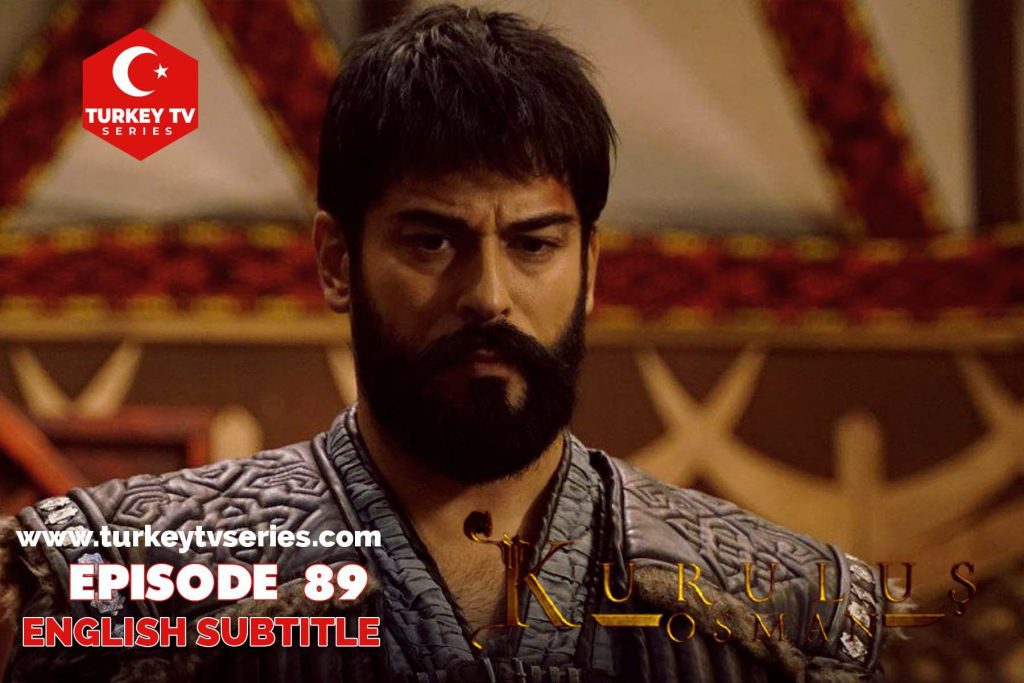Kurulus Osman 89 Bangla Subtitle Free | Turkey TV Series
Kurulus Osman 89 English Subtitle | Turkey TV Series
Kurulus Osman 89 English Subtitle | Turkey TV Series
Kurulus Osman Episode 89 English Subtitle | Turkey TV Series
Facebook Page
THE PALACE
Kurulus Osman Episode 89 English Subtitle Free | Turkey TV Series A detailed system of protocol and promotion established every person’s place within this organization. Seniority was the general rule for promotion but it was possible for a person of outstanding ability to rise more rapidly. Each person received a daily stipend according to his rank. In the sixteenth century, a novice in a Chamber received eight akçes daily, while the hâs oda baş received seventy- five. Clothes were distributed four times a year. Ağas who had reached a certain age retired on a pension. Kurulus Osman All Eposode
Ağas who served as provincial governor gained experience and skill in administrative and military matters. The most distinguished of them could rise to become beyler beyi of Rumelia, the senior provincial governorship, whence they could be promoted to the rank of vizier in the imperial council in Istanbul. Lutfî Pasha, one of Süleymân I’s grand viziers, described, in an autobiographical sketch, life in the Palace organizations. Episode 88
The writer of this treatise is the weakest of God’s slaves, Lutfî Pasha, son of Abdulmuîn. Through the bounty of the sultans, I, this humble one, was brought up in the Inner Palace from the time of the late Sultan Bâyezîd (whose abode is Paradise). At the threshold of this Ottoman dynasty, I was well disposed towards them for God’s sake, and while I was in the Inner Palace I studied many kinds of science. On the accession of his Excellency Sultan Selîm, I left the post of çuhadâr and entered the Outside Service as a müteferrika with 50 akçes daily.
Then the posts of kap c baş , mîr alem, sanjak beyi of Kastamanu, beylerbeyi of Karaman and Ankara and, finally, in the time of our Sultan Süleymân, the posts of vizier and grand vizier were bestowed on me. When I, this humble and imperfect one, had left the Palace, I consorted with many ulema, poets, and men of culture and sought to the utmost of my ability to refine my character with the acquisition of the sciences. Kurulus Osman Episode 89 English Subtitle Free | Turkey TV Series
A detailed system of protocol and promotion established every person’s place within this organization. Seniority was the general rule for promotion but it was possible for a person of outstanding ability to rise more rapidly. Each person received a daily stipend according to his rank. In the sixteenth century, a novice in a Chamber received eight akçes daily, while the hâs oda baş received seventy- five. Clothes were distributed four times a year. Ağas who had reached a certain age retired on a pension. Kurulus Osman All Eposode
Lutfî Pasha’s loyalty was typical. Until the seventeenth century, a disobedient pasha was a rare exception and then, if the kap c baş came with an order for his execution, he would perform his prayers and with resignation surrender his neck to the executioner, knowing that neither the local people nor the sultan’s slaves in his suite would risk a hair on his behalf. Kurulus Osman Episode 89 English Subtitle Free | Turkey TV Series
The slave system required all, including the sultan, to respect absolutely its rules and traditions, which received the same esteem as the kânûns of former rulers. Like the pages, the sultan himself studied with tutors on certain days of the week. He had a meticulously observed ceremony, customary usage determining even the words he had to use on certain occasions. Not even in the harem was he free. With the exception of such forceful men as Mehmed the Conqueror, Selîm I or Murâd IV, the Ottoman sultans were little more than cogs in a machine.
Pages in this over-regulated slave system attempted to make their own intelligence and capacity conspicuous among those of their equal, enduring the life in the hope that one day they would reap great rewards. Brought up in the belief that they labored in God’s path, they felt it their duty to make God’s word reign in the world. These beliefs gave meaning to their lives. Kurulus Osman Episode 89 English Subtitle Free | Turkey TV Series
Kurulus Osman Episode 89 English Subtitle Free | Turkey TV Series The Palace staff followed the sultan on the campaign, with no changes in its organization. The pages received weapons and horses, and each group in the Outside Service was in fact already organized as a military division. At the Battle of Mezökeresztes in 1596 the intervention at the last moment of the ten-thousand-strong Palace contingent decided the outcome of the battle.

From the time of Machiavelli, the autocracies of Europe began to take an interest in the Ottoman slave system. In 1624 M.Baudier wrote that ‘the order and method with which these youths are trained is proof that the Turks have retained nothing of barbarism but the name.’ In describing the Ottoman slave system in 1688 Rycaut wrote of it as, ‘if well considered and weighed, one of the most Politic Constitutions in the world, and none of the meanest supports of the Ottoman Empire’.
Lybyer’s view that this system perhaps developed under the influence of Plato’s Republic is total without foundation.3 The harem – the section reserved for the sultan’s women and family – formed a Palace within a Palace, and was, as in every Turkish household, a private place, forbidden to all strangers. Its organization complemented the slave system, an aspect of its character forgotten amidst a proliferation of fanciful tales, and paralleled the page organization.
Women for the sultan’s Palace were carefully selected from among prisoners-of-war, or from the slave markets. Women were not, however, subject to the devşirme. In 1475 there were 400 female slaves in the Topkap Palace and 250 in the Old Palace, and these girls, like the pages, passed through a long period of education and training. When they first came to the Palace they lived together in two large rooms, the Greater and Lesser Chambers, and were known as acemîs – novices.
Under the strict supervision of the kâhya kad n – a woman superintendent – they grew up as refined and skilful women. They learned the principles of Islam, at the same time acquiring such skills as sewing, embroidery, dancing, singing, playing musical instruments, puppetry or story-telling, each according to her capabilities. The acemîs in time attained the ranks of câriye, şâgird, gedikli and usta. (It is worth noting that this hierarchy and the last three terms are the same as in the guild organizations, and were used also in the bureaucracy.
It was the Ottoman practice that any skill or craft should be learned through an apprentice-master system.) In the same way as pages received promotion from the Larder to the Privy Chamber, the ustas too were selected from the ranks of the gediklis to perform a specific service for the sultan. Women from this group whom the sultan chose for his bed were distinguished with the title hâs odal k or hâseki. Kurulus Osman Episode 89 English Subtitle Free | Turkey TV Series
Until the time of Süleymân I, Ottoman sultans also took the daughters of foreign rulers as canonically legal spouses. Süleymân contracted a religious marriage with the Russian slave-girl, Roxelana, known as Hurrem Sultan, but in the period between 1574 and 1687, when the influence of the vâlide sultans came to dominate the Palace, the sultans no longer contracted canonically legal marriages. The vâlide sultans themselves were not legal wives according to the şerîat.
In the seventeenth century Osmân II and Ibrahîm I were the exceptions who contracted legal marriages. Nevertheless, four of the hâsekis – four being the canonically legal number of wives in Islam – were distinguished by the title of kad n and received special treatment. A hâseki who bore the sultan’s child received special privileges. Ceremonially crowned and dressed in sable, she went to kiss the sultan’s hand, and a private apartment was set aside for her use.
The first woman to give birth to a son took precedence over all the others, with the title baş kad n. The staff of the harem, like the pages, received a daily stipend and a clothing allowance, each group having its own special uniform. Women above the rank of usta adorned their clothes with fur. The vâlide sultan had absolute authority within the harem, and the chief black eunuch – the harem ağas or dârüssaâde ağas – stood in the same relationship to her as the chief white eunuch – the kap ağas – did to the sultan.
As the influence of the vâlide sultans increased after 1574, so too did that of the chief black eunuch, who came eventually to be the most important officer in the Palace. It is related that when the women in the harem heard the sultan’s silver-nailed slippers they at once hid from sight, since it was an offence to meet him face to face.
Any woman who disrespected the rules or the hierarchy of the harem was punished, since if a novice were to win the sultan’s heart this would undermine the rights of the senior ustas and the authority of the vâlide sultan. The vâlide sultan herself carefully chose the ustas who were to consort with the sovereign. Tradition relates that in 1536 Roxelana, Süleymân’s favourite wife, had the harem transferred from the Old to the New Palace, and henceforth gained an increasing influence over the sultan and over affairs of state.

Kurulus Osman Episode 89 English Subtitle Free | Turkey TV Series Wishing to secure the throne for her own children, Roxelana contrived the execution of her rival’s son, Mustafa. Some of the letters which she wrote to Süleymân have survived in the Palace archives, and in one of these she wrote: My Lord, your absence has kindled in me a fire that does not abate. Take pity on this suffering soul and speed your letter, so that I may find in it at least a little consolation.
My Lord, when you read my words, you will wish that you had written more to express your longing. When I read your letter, your son Mehmed and your daughter Mihrimâh were by my side, and tears streamed from their eyes. Their tears drove me from my mind … You ask why I am angry with Ibrahîm Pasha. When – God willing – we are together again, I shall explain, and you will learn the cause.4
Most of the Palace girls went as wives to the pages when they left the Palace for the outside services. Kurulus Osman 89 English Subtitle | Turkey TV Series
Finally, it should be noted that not only the sultan but all ranks of the military class adopted the slave system. The sultan’s palace provided a model for the residences of viziers and statesmen in the capital and of governors in the provinces. The law required that in the provinces beylerbeyis, sanjak beyis, subaş s, and even sipâhis in the villages should maintain retinues in proportion to the income received from their fiefs. Kurulus Osman 89 Bangla Subtitle Free | Turkey TV Series
To increase their influence some pashas maintained more than the obligatory number of kap kulus, Rüstem Pasha, for example, had 1,700 slaves at the time of his death. After a campaign pashas would recommend to the sultan the conferment of timars on their slaves who had performed outstanding services. The slave thus left the pasha’s retinue to become a sipâhî. The pages of some viziers were taken, on their master’s death, directly into the Imperial Palace. Slaves belonging to persons of the military class also had military status.
In Ottoman society, to be a slave of the sultan was an honor and privilege, and in fact, the translation of ‘kul’ as ‘slave’ is misleading. Islamic law normally considered freedom as fundamental, and slavedom as a transitory condition. It regarded the manumission of slaves as a meritorious act that religion encouraged. Canonically legal marriage with a female slave was possible. Although the Turkish traditions of family and tribal ties shaped Ottoman society in its formative period, slaves gradually grew in importance.
The mothers and tutors of the Ottoman sultans usually had slave origins, and Ducas reported that Murâd II treated his slaves as brothers5. Former owners, however, still possessed certain rights over their manumitted slaves, notably the right of inheritance, and this was an important factor in the spread of the slave system. Merchants preferred to use their actual or manumitted slaves as commercial agents, and kâdîs’ registers indicate that manumitted slaves formed the richest and most influential group in the great Ottoman cities.
The slave system was important in cultural as well as in political and economic life. The Palace school produced artists and scholars as well as soldiers and administrators, and craftsmen working for the sultan created some of the finest and most original works of Ottoman civilization. The Palace was the principal creative source in Ottoman culture. The great architect Sinan (1490? -1588), for example, came originally as a devşirme boy from Kayseri. Kurulus Osman 89 Bangla Subtitle Free | Turkey TV Series
He received all his professional training in his many years’ experience in the army and the architects’ office at the Palace, eventually becoming the sultan’s chief architect and author of many works throughout the Empire, including such masterpieces as the Süleymâniye and Selîmiye mosques in Istanbul and Edirne. There grew up in the Palace an Ottoman artistic style and aristocratic way of life which the sultan’s slaves diffused to all corners of the empire.
Classical Ottoman literature and architecture developed as Palace arts. From the fifteenth century Palace architects erected buildings in a distinctive Ottoman style throughout the empire, from Konya to Sarajevo. Most poets and writers had some connection with the Palace; Bâyezîd II’s account books show that about twenty poets regularly benefited from the sultan’s largesse. Historiography received similar encouragement. Kurulus Osman 89 English Subtitle | Turkey TV Series
Side by side with the folk histories, written in the early period in simple Turkish, Palace poets and writers in the service of Mehmed the Conqueror composed works in high literary Persian. It did not take long for Palace histories to appear, written in Turkish but imitating this ornate Persian style and, in time, a peculiarly Ottoman school of historiography came into being. Ottoman culture remained essentially a Palace culture and became sterile for this reason. In the sixteenth century, it reached its classical perfection, but confined to the service of the Palace and closed to outside influences it gradually lost its vitality.
THE CENTRAL ADMINISTRATION
In the near-eastern state, the administration of justice was considered the most important function of government. Although the great divan – the ancestor of the Ottoman dîvân-i hümâyûn – which met at fixed times to hear complaints of the people and set right injustices, was in origin a high court of justice, it was at the same time the supreme organ of government. This institution conformed with the near-eastern concept of state and had retained its importance since Sassanid times.
In Seljuk Anatolia, the example closest to Ottoman practice, the sultan came twice a week to the great divan to hear the complaints of the oppressed. Cases within the scope of the şerîat were referred to the kâdî, while administrative matters were referred to members of the divan. Bâyezîd I’s Egyptian physician, Shams al- Dîn, wrote:1 Early in the morning the Ottoman ruler would sit on a wide, raised sofa. Kurulus Osman 89 English Subtitle | Turkey TV Series
The people stood some distance away, in a place whence they could see the sultan, and anyone who had suffered wrong would come to him and state his complaint. The case was judged immediately. Security in the land is such that nowhere will anyone touch a fully-laden camel whose owner has left it and departed. Bertrand de la Brocquière visited Murâd II’s Palace in Edirne and describes how the divan assembled in that period:2 We passed through the first gate.
The door opened inwards and was guarded by about thirty slaves, all armed with staves. Should any person wish to enter without permission, they warn him once to withdraw; if he persists, they turn him back with their staves … When the said ambassador [of Milan] entered, they made him sit beside the gate. Whenever an ambassador arrives, which happens almost daily, ‘il fait porte’. ‘Faire port in France would be called ‘to be received into the king’s presence.
What we call the ‘Court du Roy’, the Turks call the ‘Porte du Seigneur’. When the sultan entered he went to a side gallery, where his seat had been prepared. This was a kind of couch, upholstered in velvet and mounted by four or five steps. He sat on this, according to their custom, in the manner of tailors when they are at work. Then the pashas, who had waited in another place besides the gallery, came and passed in front of the sultan. When they had entered the gallery, everyone else who customarily attended the divan took their places.
They posted themselves along the walls of the gallery as far from the sultanas as possible. The term cap or dergâh-i âlî – the Sublime Porte – referred originally to the place where the sultan heard suits and conducted governmental business, and eventually came to mean the Ottoman government.
In about 1475 Mehmed the Conqueror ceased to preside in person over meetings of the imperial council. However, since he could not neglect the sultan’s fundamental duty of personally hearing complaints he had a grated window opened in the ‘Mansion of Justice’, overlooking the council chamber. Through this, he could follow suits and discussions. A western source described the window:3
There is, at the end of a secret gallery, a small square window that serves as a listening post.

It is a wicker-work grille, with a curtain of crape or black taffeta, and is called the ‘dangerous window’, because the prince may, whenever he wishes, listen to and see all that takes place, without being seen and without anyone knowing whether he is there or not. It would be extremely dangerous to try to conceal or hold back anything because in these sessions they discuss all kinds of business, public and private. Kurulus Osman 89 English Subtitle | Turkey TV Series
When the dignitaries had taken their places in the imperial council, complainants received permission to enter and business began. The imperial council always preserved its original character of a high court. Murâd III once left the listening post to take a seat in the council itself when he saw the people’s affairs neglected; he thus assured that they received prompt attention. Ahmed, I arranged that the council’s deliberations should on some occasions take place in his presence and made the senior ulema attend the trial, in the imperial council, of Kâsim Pasha, who was accused of oppressing the people.
In the eighteenth century, the imperial council ceased to meet in the Palace and transacted all governmental business in the grand vizier’s residence. In 1766, however, Mustafa III commanded that it meet in the Palace at least once a week, since ‘the imperial council was first established so that the sultan could hear the complaints of those who had suffered injustices. When going to the Friday prayer, riding to the hunt, or setting out on the campaign, the Ottoman sultans would listen in person to the complaints of the people, since ‘the people should feel that the sultan is concerned with their welfare.
On the day of nevrûz – the vernal equinox – in 1591, when Murâd III was residing in his summer Palace on the sea shore, a group of residents from Galata approached in their caiques and presented their complaint against the kâdî of Galata. The sultan at once dismissed the kâdî. (In ancient
Iran the sovereigns held a great council on nevrûz, a sacred day, to hear the people’s suits.)
Turkey TV Series
To Be continue…..



